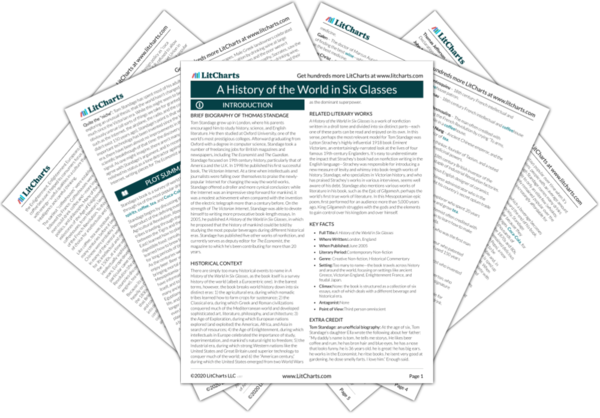Summary
Analysis
Standage begins his epilogue by arguing that the “drink of the future” is the same drink that humans consumed before they knew how to brew anything at all: water. For centuries, beverages like beer or wine were welcome alternatives to water because they carried no deadly diseases. Now, however, water purification has become so sophisticated that water can be consumed safely.
Standage comes full-circle in this epilogue by talking once again about water, the source of all life, and the first beverage that human beings drank.
Themes
Across the world, bottled water is being sold in record quantities. The popularity of bottled water in part reflects the mistaken belief that distilled water is healthier than tap water. In actuality, tap water is just as healthy as bottled water in developed nations. Most people can’t tell the difference between tap and bottled water. In fact, bottled water sometimes is just tap water, albeit with a few minerals added.
Standage notes the absurdity (but not the environmental impact) of the fact that people buy bottled water in some parts of the world, despite the fact that it’s virtually indistinguishable from ordinary tap water (most people probably couldn’t tell the difference any more than they could tell the difference between Coke and Pepsi).
Themes
Although water is taken for granted across much of the globe, in the developing world clean water is still a luxury. There are millions of cases of diarrhea and diphtheria every year, most of them brought on by drinking infected water. The United Nations has prioritized the goal of providing potable water to all the peoples of the world.
Standage doesn’t make time for a detailed analysis of the contemporary world, but simply sketches the main points of contemporary politics: mostly significantly the huge inequality between the powerful and the powerless countries of the world.
Themes
Already, the absence of potable water across the planet has had enormous geopolitical effects. During the Six Day War of 1967, Israel occupied Sinai, the West Bank, the Gaza Strip, and Golan Heights. It’s often thought that the true catalyst for this war was Syria’s attempt to divert a water canal from the Jordan River in 1964. The Prime Minister of Israel, Ariel Sharon, argued that Syria’s canal project diverted potable water from Israel—thus, Israel’s occupation of Sinai and the West Bank were not merely political moves, but also attempts to regain drinking water for its citizens. Since the 60s, potable drinking water has become increasingly precious, prompting many to believe that the next important military clashes in the Middle East will be triggered by the need for drinkable water.
Whether or not one buys Standage and Sharon’s argument, it’s clear that the need for water is a vital one—without water, people can’t live. In the future, we can imagine, thirst will catalyze plenty of long, bloody wars, especially if the United Nations fails in its stated goals of providing potable water to all the peoples of the world. In Standage’s history of beverages, he has noted an overall trend towards equality and democracy, but in his vision of the future (a vision deeply affected by “democratic” drinks and societies like Coca-Cola/America) inequality is still rampant in the most basic necessity of life—water.
Themes
Get the entire Six Glasses LitChart as a printable PDF.

Although water has prompted some military conflicts, it can also cause hostile nations to work together for the common betterment of its citizens. For example, Vietnam, Thailand, and Cambodia cooperated to ensure its peoples’ access to water from the Mekong River, in spite of the military clashes between these countries.
Standage isn’t a cynic, and here he makes his most “political” point of the book—arguing that people need to come together to ensure that no matter our nationality, race, or ideology, we all have access to the basic necessity of potable water. His examples of such treaties in Southeast Asia are inspiring (if rare), and in many ways bring us back to the beginning of the book: when people came together to form agricultural societies and began the processes of civilization and invention.
Themes
Standage concludes by reiterating that ordinary drinks like beer and Coke “tell stories” about history. Although drinking a coffee or a glass of wine is an ordinary act, this act was made possible by the ingenuity of thousands of people across many centuries.
After twelve carefully-argued chapters, Standage’s thesis now seems more plausible than it initially appeared (even if this epilogue on water is arguably the most interesting argument of all). No matter what one’s views of certain aspects of history (like American capitalism or British imperialism) are, Standage has proven that certain drinks can be examined to tell the story of world history—albeit a condensed and Eurocentric one—because these beverages’ trends of invention and popularity reflect, symbolize, and even affect much larger trends of history itself.
Themes












